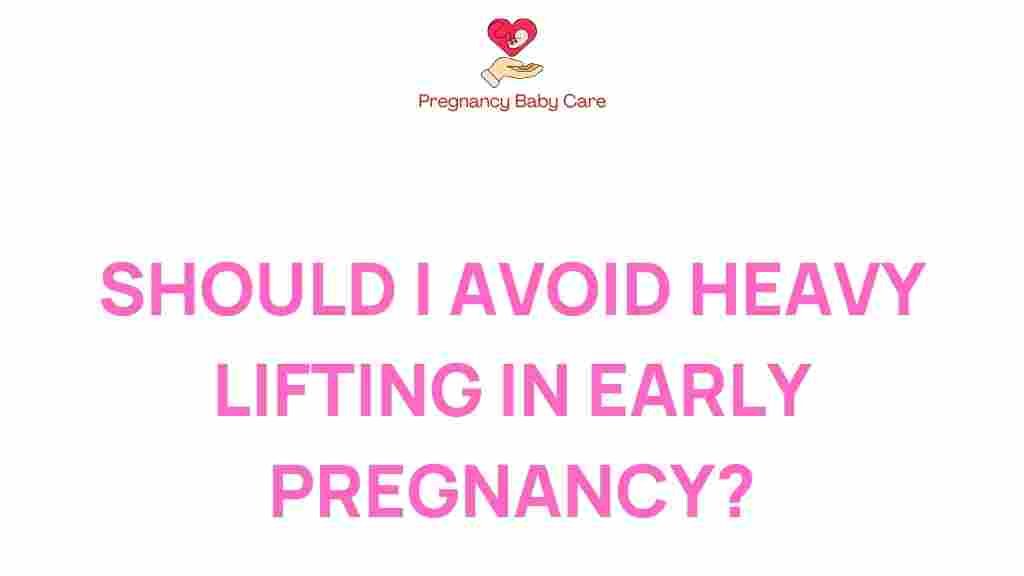Should You Avoid Heavy Lifting in Early Pregnancy?
When it comes to early pregnancy, many women find themselves filled with questions about what activities are safe and what should be avoided. One common concern is whether heavy lifting poses health risks during this delicate time. Understanding the implications of physical activity during pregnancy is essential for both the mother’s and baby’s health. This article explores expert advice on heavy lifting, health risks, and safety tips for mothers-to-be.
Understanding the Risks of Heavy Lifting in Early Pregnancy
Heavy lifting refers to moving or carrying objects that are significantly beyond your usual load, which can strain your body. During early pregnancy, several changes occur in a woman’s body that may influence her ability to lift heavy objects safely. Here are some key points regarding the health risks associated with heavy lifting:
- Hormonal Changes: Pregnancy increases levels of the hormone relaxin, which can loosen ligaments and joints, making them more susceptible to injury.
- Center of Gravity: As your body changes, your center of gravity shifts, which can affect balance and coordination.
- Fatigue: Many women experience fatigue in early pregnancy, which can diminish strength and increase the risk of accidents when attempting to lift heavy items.
- Increased Pressure: Heavy lifting can put additional pressure on the uterus, potentially leading to complications.
Expert Advice on Heavy Lifting and Maternal Health
Experts recommend that pregnant women approach heavy lifting with caution. According to the American College of Obstetricians and Gynecologists (ACOG), while many women can continue their usual activities, including some forms of physical labor, modifications may be necessary. Here are some expert guidelines:
- Consult with your healthcare provider to discuss your specific circumstances and any underlying health conditions.
- Limit lifting weights over 20 pounds, especially in the first trimester.
- Use proper lifting techniques, such as bending at the knees and keeping the load close to your body.
- Avoid lifting items overhead or in awkward positions to prevent strain.
- Listen to your body; if you feel discomfort or pain, stop immediately.
Physical Activity in Early Pregnancy: What You Need to Know
Engaging in physical activity during early pregnancy is beneficial, promoting overall health and wellness. However, it’s crucial to differentiate between safe exercises and potentially harmful activities. Here are some safe forms of physical activity:
- Walking: A low-impact exercise that helps maintain fitness without putting undue stress on the body.
- Swimming: Provides a full-body workout while minimizing strain on joints.
- Yoga: Enhances flexibility and relaxation, which can be beneficial for pregnancy.
- Strength Training: Light strength training with appropriate weights can be safe and beneficial when done correctly.
For more detailed guidelines on physical activity during pregnancy, refer to this resource.
Safety Tips for Lifting in Early Pregnancy
If you must lift during early pregnancy, consider the following safety tips to minimize health risks:
- Warm-up: Always warm up your muscles before lifting to prevent injury.
- Ask for Help: Don’t hesitate to ask for assistance with heavy items.
- Break It Down: If possible, break larger loads into smaller, more manageable pieces.
- Use Assistive Devices: Consider using dollies or carts for heavy items to avoid lifting altogether.
- Stay Hydrated: Keep hydrated, as dehydration can lead to fatigue and dizziness.
Common Troubleshooting Tips for Lifting Concerns
Even with precautions, you may encounter issues while lifting during early pregnancy. Here are some troubleshooting tips:
- Feeling Pain or Discomfort: Stop lifting immediately and consult your healthcare provider if you experience pain.
- Difficulty Breathing: If lifting makes you short of breath, reduce the weight or stop altogether.
- Dizziness or Lightheadedness: If you feel dizzy, take a break and sit down until the feeling passes.
- Persistent Fatigue: Listen to your body; if you are consistently fatigued after lifting, it may be best to limit this activity.
Conclusion: Prioritizing Your Health and Safety
In summary, while heavy lifting in early pregnancy can pose health risks, it is not an absolute prohibition for all women. Understanding your body’s limits and following expert advice is crucial. Always prioritize your safety and that of your baby by consulting with healthcare professionals and adhering to lifting guidelines. Remember, maintaining a healthy lifestyle during pregnancy includes finding a balance between staying active and protecting your maternal health. For more information, be sure to check out this expert resource on pregnancy care.
This article is in the category Pregnancy and created by PregnancyBabyCare Team
